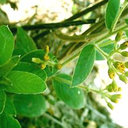Evaluation of the impact of Polygonum capitatum, a traditional Chinese herbal medicine, on rat hepatic cytochrome P450 enzymes by using a cocktail of probe drugs.
Sleutelwoorden
Abstract
BACKGROUND
Polygonum capitatum is a well-known Miao medicinal plant that has been used for many years for its unique therapeutic effects on various urological disorders, including urinary calculus and urinary tract infections. To investigate the effect of Polygonum capitatum on cytochrome P450 (CYP) isoforms (CYP1A2, CYP2C9, CYP2C19, CYP2E1, and CYP3A4) in vivo using a "cocktail" approach by administering five probe drugs to rats. This study assessed the potential of Polygonum capitatum to interact with co-administered drugs.
METHODS
An aqueous extract of dried whole Polygonum capitatum was prepared and administered orally to rats at a dose of 0.58g/kg or 1.74g/kg twice daily for 7 or 14 consecutive days. A cocktail of caffeine (1.0mg/kg), tolbutamide (1.0mg/kg), omeprazole (2.0mg/kg), chlorzoxazone (4.0mg/kg) and midazolam (4.0mg/kg) was then administered on the eighth or fifteenth day to evaluate the effects of Polygonum capitatum on CYP1A2, 2C9, 2C19, 2E1, and 3A4, respectively. Blood samples were collected at a range of time-points and the plasma concentrations of the probe drugs were simultaneously quantified using ultra high-performance liquid chromatography-tandem mass spectrometry. Pharmacokinetic parameters were calculated to evaluate the effects of Polygonum capitatum on the activities of these CYP enzymes in rats.
RESULTS
Polygonum capitatum pre-treatment had no significant effect on the pharmacokinetic parameters of caffeine, omeprazole or chlorzoxazone. However, the pharmacokinetics of tolbutamide and midazolam were affected significantly (P<0.05) by Polygonum capitatum, which induced more rapid metabolism of these probe compounds.
CONCLUSIONS
These results suggested that Polygonum capitatum could induce CYP2C9 and CYP3A4, and did not influence CYP1A2, CYP2C19 or CYP2E1. Therefore, the clinical dose of drugs metabolized by human CYP2C9 or CYP3A4 may need to be adjusted in patients taking Polygonum capitatum, as this herbal medication may result in reduced effective concentrations of these drugs.





